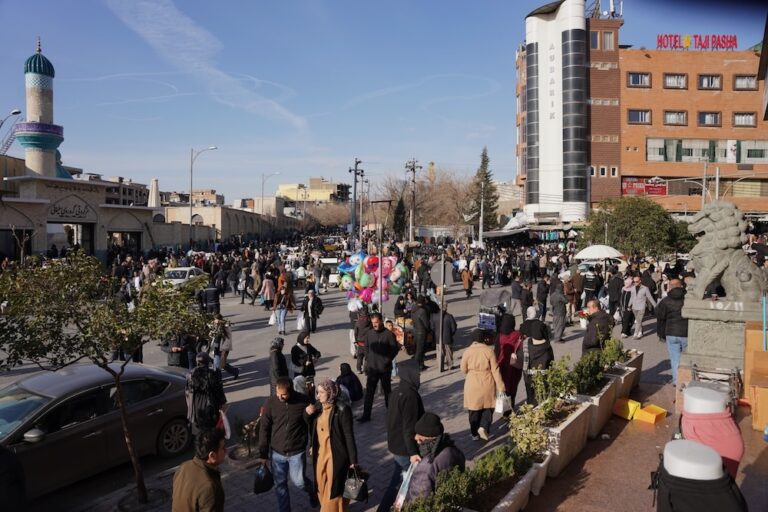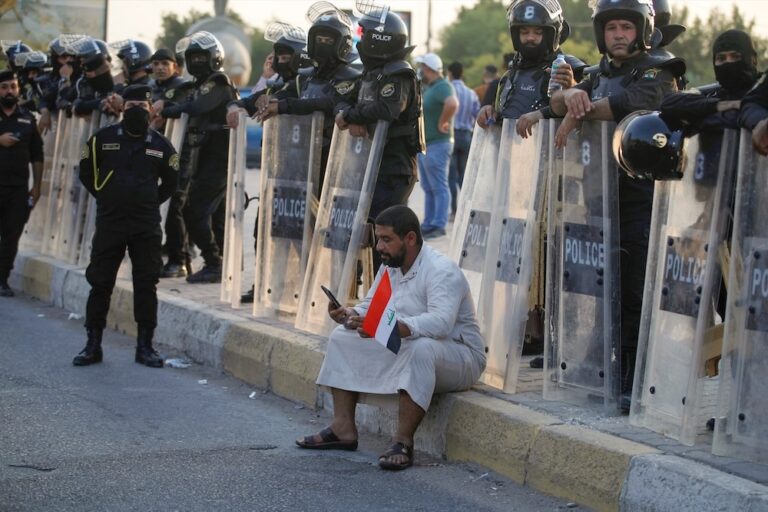(IFJ/IFEX) – The following is a 17 March 2003 IFJ media release: World Journalists Issue “Donât Target Media” Appeal As Military Prepare for War in Iraq Journalists and media workers in Baghdad must not be targeted by the military on either side, said the International Federation of Journalists today. “Military leaders must make sure that […]
(IFJ/IFEX) – The following is a 17 March 2003 IFJ media release:
World Journalists Issue “Donât Target Media” Appeal As Military Prepare for War in Iraq
Journalists and media workers in Baghdad must not be targeted by the military on either side, said the International Federation of Journalists today. “Military leaders must make sure that journalists and media are not in their sights as they prepare for war,” said Aidan White, General Secretary of the IFJ. “Hundreds of journalists may be working in the field and their role is vital to keeping the world informed.”
The IFJ has made a last-minute appeal to United States Secretary of State Donald Rumsfeld and to Iraqi President Saddam Hussein to give instructions to army commanders to respect the rights of journalists and media staff. “Under international law journalists should be treated as non-combatants and their rights respected,” said White.
“Even though the United States and the Iraqi regime have not formally ratified the protocols to the Geneva Conventions which give protection to journalists, we appeal to them to respect the rights of reporters and media staff.”
“All journalists should pull back from unsecured positions as soon as possible,” says the IFJ, which welcomed the immediate withdrawal of major news networks from Iraq. “But we have concerns for local and regional media and many freelances who are roaming the region and who are now most at risk.”
The IFJ is also appealing for journalists travelling with army units to be given the freedom to report without undue interference. “This is a critical moment for journalism as much as it is for the political parties to this conflict,” said White. “When hostilities start it is imperative that journalists apply traditional professional standards of impartiality and do not give themselves up to military propaganda.”
The IFJ and many other journalists’ groups fear that manipulation and control of the media message, which has been a feature of military strategies in recent conflicts, will undermine the quality of reporting from the region.
The calls for professionalism and respect for journalists’ rights come as a number of incidents involving journalists reporting from the region raise new concerns about the safety of reporters on the spot.
On March 1, three Argentine journalists were detained in Jordan. The journalists, Juan Castro, journalist and director, executive producer Rubén Vivero and camera operator Cristian Sedam, all from Channel 13, were detained while leaving Iraq and heading towards the Jordanian capital, Amman.
During their detention, which lasted six hours, the Jordanian authorities seized their equipment and destroyed material that they had documented at the Iraqi border. Jordan claims the journalists had violated a law that prohibits the filming of military bases or troops in training. Argentine officials negotiated on behalf of the journalists. As a result, Castro and his team were released and their equipment was returned.
On March 8, Kuwait warned foreign media against cooperating with Israeli news media, threatening journalists with legal action if they did not heed the warning. About 1,000 journalists from around the world have been accredited with the allied forces stationed in Kuwait, but there are no Israeli journalists. “This sort of political censorship is an affront to democracy and completely unacceptable,” said Aidan White.
At the same time, a Canadian journalist has been kicked out of Iraq after the country’s secret service accused him of spying on behalf of Israel. Scott Taylor, publisher of the military affairs magazine Esprit de Corps in Ottawa, was in Iraq working for the Sun chain of newspapers. Taylor said he was confronted by Iraqi secret service agents who asked him to leave the country after accusing him of spying for the Israeli intelligence agency, Mossad. They told him the allegation was based on a “remark” from another journalist. They advised him to leave the country as “quickly and quietly as possible.”
The IFJ represents more than 500,000 journalists in more than 100 countries.


